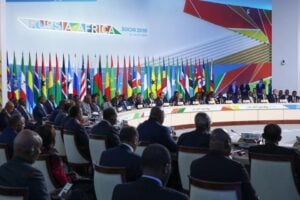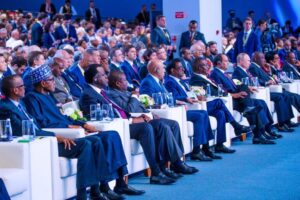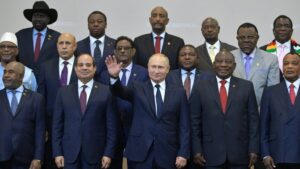Russia-Africa Summit: Policy Framework for Further Cooperation

On October 23-24, the Russia-Africa Summit and Economic Forum took place in Sochi. Over 10 000 participants and representatives of 54 African countries took part in the event.
The participants signed more than 50 deals, at a total value of more than 800 billion rubles. Moreover, African countries received 300 cooperation offers in different fields.
The event was a signal of Russia’s willingness to participate actively in the “battle for Africa”, which is being waged by leading actors of international relations. Africa is a resource-rich continent, has considerable “political potential” in the context of voting in international organizations. In addition, the continent is ready to cooperate with many countries. As a result, Africa becomes a “welcome piece” for the United States, China, the European Union, India, and Japan.
Although the focus was on economic cooperation, the Forum became an instrument to promote the main goal of Russia in Africa. It’s political influence through the control over natural resources and military support.
The above-mentioned Summit was only the beginning since the participants agreed to hold a similar event every 3 years and cabinet-level consultations – annually. For instance, the next summit, on the initiative of Ethiopian Prime Minister Abiy Ahmed Ali, may take place in Ethiopia.
Russia-Africa Summit laid the pillars for cooperation not only at the bilateral level. As the Government of Russia and the African Union, as well as the Eurasian Economic Commission and the African Union Commission, signed the memorandums of understanding and cooperation.
Statements of support for Algeria and Sudan to normalize the situation in these countries are also signals about Russia’s readiness to intensify political participation in the region. Likewise the agreements between the International Agency of sovereign development (IASD) with the governments of Niger, Guinea, DRC for political consultations and development.
The most interesting in this context is the Final declaration of the Russia-Africa Summit.

In addition to the general phrases on the UN Charter support, expanding official and informal cooperation, intensifying contacts within the UN, BRICS and other international forums, joint efforts on terrorism and extremism, intensification of trade interests, trade intensification regulations, the document has several interesting insights. It’s worth to emphasize the following:
- “Develop an equitable dialogue taking account of the interests of the Russian Federation and African States on the basis of a multilateral world order”.
- “Coordinate efforts to reform the UN, including its Security Council, as well as to increase its capacity to counter the existing and new global challenges and threats”.
- “Strengthen global governance and consider reforming the UN Security Council taking into account the geopolitical realities with a view to making it a more representative body by ensuring greater participation of African States”.
- “Continue strengthening contacts and coordination between Russia and non-permanent UN Security Council members from among African States with a view to jointly promoting shared interests”.
- “Develop cooperation within other international organizations and provide greater mutual support when holding elections to their governing bodies and making decisions on issues of particular importance for the Russian Federation and African States”.
- “Intensify Russia–Africa inter-parliamentary contacts and coordinate efforts for international parliamentary events to arrive at decisions and resolutions that would benefit the Russian Federation and African States”.
- “The principle African solutions to African problems should continue to serve as a basis for conflict resolution”.
Obviously, such documents usually have general formulations, but even these selected replicas reflect the consistent tone.
It lays in strengthening the multipolar world order with a focus on reforming the Security Council. In this eventuality, Russia could promote its own interests easier, having support from a wider range of countries, including African ones.
African countries have significant “political capital” concerning voting in international organizations. 54 countries of Africa, representing almost a third of the votes in the UN General Assembly, are a very useful resource for Russia to “push” decisions across international venues.
The phrase “jointly promoting shared interests” reflects these Russia’s aspirations to seek the support of African countries to promote its interests, form a common agenda and make use of the African political potential. Most importantly, the phrase “multilateral world order” becomes more clear in the context of intensifying cooperation between BRISC and African countries, stated at the Forum.
The declaration of the Russia-Africa Summit also contains lucrative statements for Africa. For example, the principle of “African solutions to African problems“, that is so desirable to African countries, which try to avoid the trend of neo-colonialism and have Africa’s fate in the Africa’s hands.
And “reforming the UN Security Council […] to making it a more representative body by ensuring greater participation of African States” reflects the aspiration of African countries to become P-5 members. For instance, we could recall speeches of Presidents of Sierra Leone, Angola, Zambia at the annual session of the UN General Assembly in September 2019. The representatives have stated firmly that it’s high time to give Africa representation which continent deserves. And these are just the last striking cases, not including earlier actions and arguments.
The participants signed agreements in the military, economic, mining, energy, infrastructure, educational and scientific fields during the Russia-Africa Summit.

Below is a list of the major arrangements in each area.
The main agreements in the economic sphere:
- The Investment Company “Uralkali” agreed to finance agriculture and mining projects in Zimbabwe.
- State Development Corporation VEB.RF is ready to provide up to € 425 million for the construction of an oil refinery in Morocco.
- The company “FosAgro” plans to open a trade office in South Africa and has signed the memorandum of understanding with Kropz.
- “Uralchem” together with Grupo Opaia are going to build a complex for the production of ammonia and carbamide in Angola.
- “EFKO” Group and Egyptian company United Oil have signed a partnership agreement, the main goal is to build a joint venture on fat-and-oil products.
- Negotiations are under way with Zambia and Ethiopia concerning more intense cooperation under a debt-for-assistance scheme.
Arrangements in the energy sector:
- Russia and Ethiopia signed the cooperation treaty in the field of the peaceful application of atomic energy.
- Russian Government intends to build new power plants in the CAR.
- Preliminary negotiations are held in the field of gas energy with Uganda, as well as with Zambia on the construction of nuclear power plants.
Mining Deals:
- The JSC “ROSGEO” signed memorandums with Sudan, Equatorial Guinea, Rwanda and South Sudan on mineral exploration.
- Lukoil signed the memorandum with Equatorial Guinea on the exploration and production of fossil fuels.
- JSC “Giprotsvetmet”, REC (Russian Export Center Group) and Afreximbank signed the agreement for establishing an intergovernmental platform to implement mining projects in Africa.
- By the end of 2019, Alrosa will receive 15 exploration licenses in Zimbabwe.
- Talks are under way with Sudan (gold), Mozambique (diamonds), Congo (joint gas pipeline).
Infrastructure Arrangements:
- Russian Railways and the Egyptian National Railways signed the protocol for collaboration on the construction of railway tracks in Egypt.
- Negotiations are under way with Egypt on charter flights.
- Morocco intends to become a logistics hub for Russian energy companies, which are going to cooperate with African countries.
- Russia and Angola signed the memorandum of understanding on the development of the railway sector.
- Russia expressed its desire to set up data centers in Africa to promote its software.
- Russian Railways will participate in the implementation of infrastructure projects in Nigeria, a number of projects have already been proposed, as well as in the DRC. The countries signed relevant agreements.
Deals in the field of education and science:
- The Russian Academy of Sciences (RAS) expects to set up offices in a number of African countries, primarily in Ethiopia, South Africa, Egypt and Uganda.
- Russia is considering increasing the quota of budget places in Russian universities for students from the continent.
- Russia and South Africa plan to sign the memorandum of cooperation in youth policy in 2020.
- Russian representatives presented the new dry Ebola vaccine, which was developed in Russia and could be used in Africa.
- Negotiations are under way concerning the possibility of establishing a research center for the prevention of infectious diseases, similar to one in Guinea.
Arrangements in the military field:
- $ 4-billion arms contracts were signed with 20 African countries, including Uganda, Rwanda, Mozambique, Angola.
- Russia and Niger are under the agreement for the supply of 12 Mi-35 combat helicopters.
- Russia plans to open weapons repair centers, as well as for helicopter and armored vehicles, in Angola, Uganda and Nigeria.
- Negotiations are under way with CAR (training of military personnel in Russian institutions), Namibia (armaments), Sudan (purchase of S-400 complexes), Ethiopia (possibility of building a service center for aviation), and South Africa (joint arms production).
Nevertheless, not everyone became enthusiastic over after Russia-Africa Summit.
Despite the declared “Russia’s return to Africa”, some experts (even Russian) are sure that it is just a smokescreen to promote those businesses, which have already been operating in Africa, a more introductory event after which nothing important will happen, a familiar PR action. Certainly, the main question is how all the declared goals and arrangements of the Russia-Africa Summit will be implemented.
Regardless of the other side of cooperation, Africa does not need projects that use its potential without altering the continent’s oppressive problems.
Obviously, these should be projects aimed at tackling poverty and unemployment, attracting new technologies, and ensuring sustainable development. But the formula of military cooperation in exchange for resources or political use – does not fit into this framework.


